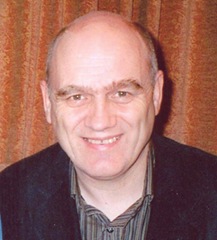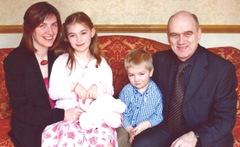Denzil McDaniel
 Editorial Manager of the Impartial Reporter newspaper in County Fermanagh Denzil McDaniel has seen journalism change over the past 37 years, from stories of death and destruction to issues surrounding health and education. Here, he outlines his career and describes how he enjoys “precious” time spent with family and friends.
Editorial Manager of the Impartial Reporter newspaper in County Fermanagh Denzil McDaniel has seen journalism change over the past 37 years, from stories of death and destruction to issues surrounding health and education. Here, he outlines his career and describes how he enjoys “precious” time spent with family and friends.
How did you get started in journalism?
There was no career plan and it happened by accident. After A-levels I worked in the Civil Service and used to write football reports for my local paper, the Impartial Reporter. When a job came up as cub reporter in the Impartial, I fancied having a go and was taken on as trainee. It’s much, much more difficult nowadays to get into the profession.
That was in 1973, and I very quickly realised that it suited me well. As a very quiet and shy person, I loved expressing myself in written form and built up confidence by meeting a wide range of people. Thanks to the guidance and support of my editor, Mervyn Dane, who was a true journalist, I progressed to become sports editor and then succeeded him in 1987.
You have written a book on the 1987 Enniskillen bomb. How did that event impact on you personally and as a journalist?
I had already been in journalism for 24 years when I began the book in 1997, the 10th anniversary of the bomb; but I think I learned more in that one year than the previous 24. I had lived through the bombing and its aftermath in my home town. I began with the idea that I would try to find out more about the IRA operation and the political impact. But as I undertook all the interviews, I found myself drawn more and more to the very moving stories of the families of the dead and injured. It was a very deep experience and I found it incredible that people would trust a journalist enough to tell them very personal stories. I felt something of a responsibility to tell their stories and put them on record.
What is the importance of local weekly newspapers in the current culture of 24 hour news?
The local newspaper was once described to me as the backbone of the industry and I think that is as true today as it ever was. Local journalism is journalism in its purest form; real stories about real people told in their home area.
All life tends to be reflected in the local paper, much of it hardly world-shattering but vital and relevant to local people. That sort of news isn’t reflected enough in the dailies, television, radio or websites. I stress local journalism, rather than local newspapers, because I think the story is much more important than the medium. People will always want to know what is going on in their own area and it is very important that the local paper gives them a voice.
What makes a good story?
You always get a gut feeling for a good story, but putting down a definition is incredibly difficult. I like stories about people or at least about issues that are particularly relevant to people’s lives. Throughout my career the news agenda has changed dramatically. During the 1970s and 1980s the local paper was a strange mixture of ordinary everyday life and the death and destruction of two violent decades. Apart from the fact that we have, mostly, moved on from that, I think people are much more inquisitive and tuned in to what is going on around them.
The failings of our Health Service, the controversy over education, the abuse of children, the mistreatment of our elderly – people want their say and the local papers can play a significant part in asking questions and helping society to become more open and accountable. But don’t get me started on the lack of accountability in the public sector.
If you had the chance to meet up with three people for lunch, who would they be and why?
I’ve tried thinking of high-profile or famous people in answer to this, but I really can’t. Instead, I would say that I am always more comfortable with a group of friends that I’ve kept in touch with ever since we played football together 25 to 30 years ago: Paul Keenan, Tony Roofe, “Hoppy”, John Craig and others. We have a wonderful bond forged through some good times and some sad times. I think it’s important to remember where you come from and lunch with people from my roots would give me plenty of laughs and tears – might be more than three though and I would include my best mate Trevor Birney even if he is a bit younger than us!
How do you like to relax outside work?
Family, faith, friends and football!
Time at home with my wife Heather and my two youngest kids, Sarah (12) and David (8) is precious and very relaxing. David shares my passion for football. He is Manchester United daft and I’m a lifelong Tottenham fan, so there may be trouble ahead! My Christian faith is important to me and us all as a family. You can imagine the Sunday routine; service at Rossorry parish church, home to read the Sunday papers, lunch together and then down to Sky Sports Super Sunday, or the GAA championship in the summer months.





